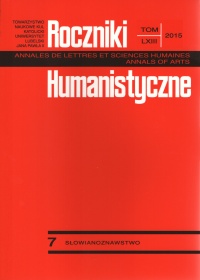Память, мифологизация или мифопоэтика? Лермонтов в свете религиозной философии Серебряного Века
Abstrakt
Pamięć, mitologizacja, poetyka mitologiczna? Lermontow w świetle filozofii religijnej Srebrnego Wieku
W artykule podjęto problem podsumowania i zarazem zderzenia poglądów rosyjskich filozofów religijnych Srebrnego Wieku na twórczość Lermontowa. Polemiczny osąd Włodzimierza Słowiowa stał się impulsem do przewartościowania pozycji Lermontowa w rosyjskim kanonie literackim. Poczynając od Mierieżkowskiego, który odczytał utwory poety zgodnie z kryteriami własnych teorii metafizycznych, ich spekulatywnym charakterem i dualistycznym kodem, kolejni myśliciele, w tym Mikołaj Bierdiajew i Lew Szestow, starali się odnieść do dylematu: „Puszkin czy Lermontow”, nawet jeśli były to ich krótkie rozproszone uwagi. Motywy religijne, obecne w liryce i prozie Lermontowa, odzwierciedlają fakt, że kod sakralny rosyjskiej literatury i sztuki nieobcy jest także jego poetyce. Widoczne jest to zwłaszcza w zamyśle kompozycji wstępu do powieści Bohater naszych czasów. Wasilij Rozanow dostrzegł w Lermontowie „mistagoga”, o. Paweł Florenski, rozpatrując jego twórczość głównie w ramach własnej teorii na temat Sofii, akcentował w nim „pierwiastek tytaniczny”. S. Bułgakow i S. M. Sołowiow próbowali objaśnić negatywną ocenę W. Sołowiowa wobec Lermontowa. Prace filozofów religijnych przyniosły obraz zdecydowanie przeciwstawny do oceny Lermontowa przez następne pokolenia historyków literatury, którzy przedstawiali go jako zwulgaryzowanego krytyka atmosfery społeczno-politycznej swej epoki.
Память, мифологизация или мифопоэтика? Лермонтов в свете религиозной философии Серебряного Века
В настоящей работе делается попытка суммировать и контрастировать взгляды русских религиозных философов эпохи Серебряного века на творчество Лермонтова. Полемичная оценка Владимира Соловьева дала толчок переосмыслению места Лермонтова в отечественном каноне. Начиная с Мережковского, истолковавшего произведения Лермонтова в согласии с дуалистическим кодом собственной метафизической умозрительной конструкции, все религиозные философы, включая Н. Бердяева, Л. Шестова, откликались на дилемму «Пушкин или Лермонтов», даже в форме кратких разбросанных замечаний. Религиозные мотивы, фигурирующие в лирике и прозе Лермонтова, внушают, что сакральный код русской словесности и художества определяет и его поэтику. Это очевидно в замысле композиции его предисловия к роману Герой нашего времени. В Лермонтове В. Розанов узрел «мистагога», о. Флоренский, трактуя его творчество преимущественно в рамках своего учения о Софии, акцентирует и «титаническое начало». О. С. Булгаков и С. М. Соловьев разъяснили факты, результировавшие негативную оценку Лермонтова В. Соловьевым. В сочинениях религиозных философов создавалась картина, резко противостоящая прочтениям последующих поколений историков литературы, которые старались выставлять художника-Лермонтова как вульгаризированного критика общественно-политической атмосферы своего времени
Copyright (c) 2015 Roczniki Humanistyczne

Utwór dostępny jest na licencji Creative Commons Uznanie autorstwa – Użycie niekomercyjne – Bez utworów zależnych 4.0 Międzynarodowe.





